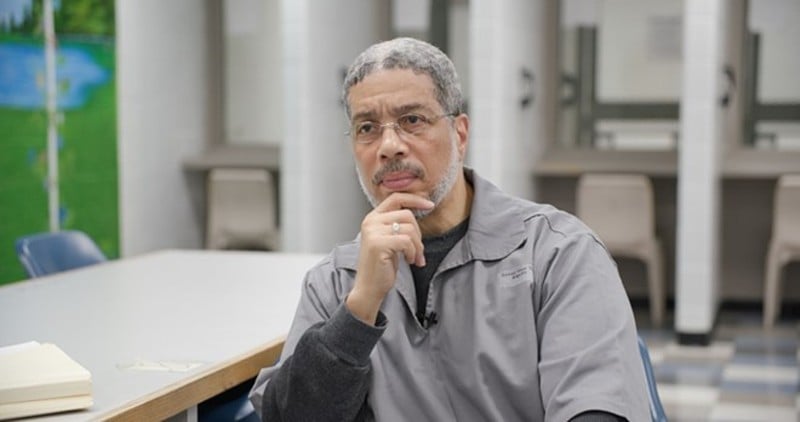A St. Louis County man who claimed he was nearly 2,000 miles away from the quadruple homicide for which he was convicted was executed tonight at a Missouri prison in Bonne Terre.
Leonard Taylor, 58, died by lethal injection at 6:15 p.m. Tuesday night for the 2004 murders of his live-in girlfriend, Angela Rowe, and her three young children.
Rowe and Alexus Conley, 10; AcQreya Conley, 6; and Tyrese Conley, 5 were found dead at their house in Jennings on December 3, 2004. Each suffered at least one gunshot wound to the head. Angela Rowe also had a graze wound to her chest and a bullet wound in her left arm.
In the execution chamber, Taylor laid flat on a bed, under a thin white sheet. He hardly moved during the time state witnesses were permitted to view Taylor. His eyes stayed shut. For a few moments, his chest heaved up and down, and then his breathing slowed. He was pronounced dead nine minutes after a five-gram lethal injection shot was administered.
Rowe’s older sister, Gerjuan Rowe, said after Taylor’s execution that “justice was served.” She says she’s celebrated her lost sister, nephew and nieces’ birthdays for the past 18 years: “I’ve always wondered what they’d be like.”
“Maybe now I can move forward a little bit — just a little bit,” Gerjuan Rowe said. “Just take baby steps every day.”
For his supporters, Taylor’s death was met with anger and frustration.
“Today, Leonard Raheem Taylor was unjustly killed by the very system that should have protected,” the Midwest Innocence Project said in a statement to the RFT.
Taylor had long maintained he was in California at the time of the murders. Since his trial in 2008, new evidence — most obtained in just the past few months — had supported his claim.
At the center of Taylor’s innocence claim is the disputed time of death for Rowe and her children.
In a pre-trial deposition, Dr. Phillip Burch testified that Rowe and her children were killed about two or three days before their bodies were found on December 3, 2004. At trial, however, Burch changed his opinion and said the murders could have occurred two to three weeks before their bodies were found — a time when Taylor was still in St. Louis.
In an affidavit on January 25, forensic pathologist Dr. Jane Turner said signs pointed to the murders occurring days, not weeks, before the bodies were found.
Deja Taylor, Taylor’s daughter who was 13 at the time of the murders, claimed in a November 9, 2022 court filing that her father was in California at that time. She said her father had put her on the phone with Rowe, who “seemed very excited to meet” her. Deja Taylor also said she spoke with one of Rowe’s children during the phone call, which lasted about 20 to 30 minutes.
Taylor’s supporters also maintain that a confession police obtained from his brother, Perry Taylor, was coerced. Perry Taylor originally told police his brother had confessed the murders to him. He recanted the statement at trial.
“I’ve seen a lot of cases over my career and this was one of the strongest cases of innocence I’ve ever seen,” Kent Gipson, one of Taylor’s attorneys, tells the RFT.
Up until his final hours, Taylor’s attorneys hoped the U.S. Supreme Court would stay Taylor’s execution and appoint a special master to investigate Taylor’s innocence claims. But the court declined to halt Taylor’s execution around 4 p.m.
Earlier in the week, organizations that focus on wrongful convictions, including the New-York based Innocence Project, asked Governor Mike Parson to appoint an independent board of inquiry to evaluate Taylor’s case. Parson shot down the request Monday afternoon, calling Taylor’s claim of innocence “self-serving.”
A few hours later, St. Louis County Prosecuting Attorney Wesley Bell doubled down on an earlier decision he made not to leverage a newly-passed law to get Taylor a hearing on his innocence. Though Bell opposes the death penalty and will not seek it as a matter of office policy, Bell said in a statement that his office “believed the jury got the verdict right.”
“The only way I was confident we were going to get anywhere was if Wesley Bell would’ve filed under that new law,” Gipson says.
But Bell, who took steps to see a special prosecutor appointed before the November execution of Kevin Johnson, only to see the process halted by the Supreme Court, was unwilling to go to the mat for Taylor.
Bell’s statement also contained this somewhat ominous suggestion: “For this office to provide details on why we came to this judgment could only further incriminate a person who sought relief from this office and currently has appeals pending.”
In his final official statement, Taylor did not opine about the perceived injustice in his case. Rather, he quoted a verse from the Quran, writing in part, “And do not speak of those [Muslims] who are slain in Allah’s way as dead; nay, (they/we are) alive, but you do not perceive [their life and strength].”
Taylor, who is Muslim, continued to write that “Muslims don’t die.” He wrote, “We live eternally in the hearts of our family and friends.”
Taylor had requested a spiritual advisor to stay by his side as he received a lethal dose of pentobarbital. The state denied his request late Monday, saying he did not ask for an advisor’s presence in time. (Taylor had signed a document on January 25 saying he did not want witnesses for his execution.)
Missouri Department of Corrections Communications Director Karen Pojmann says Taylor’s attorneys had requested on Monday to be witnesses as well. Their requests were also denied.
All told, there were nine witnesses to Taylor’s execution chosen by the victims — and none by Taylor. Fifty-eight demonstrators stood outside of the prison in support of Taylor, with four others who stood in support of his execution.
MacArthur Justice Center Co-Director Megan Crane, who said her request to be a witness was also denied, called the denial of Taylor’s chosen witnesses “an undeniable and irreversible injustice.”
“But, in the words of Raheem, he will ‘live eternally in the hearts of family and friends,’” Crane says. “Up until his final moment, he was joy, he was light, he was a rock. His spirit could not be destroyed.”
Rev. Darryl Gray, a Christian minister who served as spiritual advisor to Kevin Johnson, says Taylor joined his congregation in a church service over the phone on Sunday.
“It was an amazing experience,” Gray says. “He got a chance to speak to our congregation and they got a chance to pray for him.”
Taylor spent his 19 years of incarceration mentoring younger inmates, studying law and serving as president of the Potosi Correctional Center’s chapter of the NAACP.
“He’s a great person,” says Michelle Smith, co-director of Missourians Against the Death Penalty. “Very charismatic, very intelligent.”
Taylor is the 95th inmate and the 39th Black man to be executed in Missouri since the state began executions by lethal injection in 1989. He’s also the third person to be executed in Missouri in the past 70 days as part of a trio of cases put in motion by former Attorney General Eric Schmitt before his election to the U.S. Senate.
More than 3,300 formerly incarcerated individuals have been exonerated for crimes they did not commit, including 52 people in Missouri, four of whom were on the state’s death row, according to the National Registry of Exonerations.
Many of Missouri’s exonerees would not have lived to be exonerated had they been sentenced to death like Taylor.
“It’s a shame to kill him without giving him a chance to prove his innocence,” Gipson says. “He probably isn’t the first and probably won’t be the last one.”
Coming soon: Riverfront Times Daily newsletter. We’ll send you a handful of interesting St. Louis stories every morning. Subscribe now to not miss a thing.Follow us: Google News | NewsBreak | Reddit | Instagram | Facebook | Twitter




